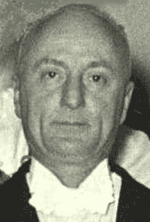
|
|
Birthdate
August 9, 1899
Country of origin
Italy
Web site
Biography
Born on August 9, 1899 in Palermo, Italy.
Died in 1971 in Italy.
--------------------------------------------------------
There are many musicians whom we have forgotten. In the past it was due to the lack of record-keeping tools to safeguard their works. The oblivion of the artists of the 20th Century is due most often to particular historical facts, personal reasons and pure chance.
Gioacchino Angelo, born in Palermo, a city generously endowed with musicians, on the August 9th, 1899, at the highpoint of the “Belle Epoque”, is totally and unjustly forgotten.
This was a particularly rich period for music, in which the “pioneers” of execution, such as Alberto Favara and Giacomo Baragli, set the basis for modern music listening. They promoted a renewal of the flavor and knowledge of the repertory that was then defined “pure”, “classic”, “German”: accurate interpretation of Beethoven’s symphonies, Wagner’s music, chamber masterpieces of Haydn, Beethoven, Schumann, or Brahms.
Angelo did his apprenticeship during the last sparks of this apparently golden season, abruptly cut short by the Second World War.
He studied violin with Franco Tufari at the Viuncenzo Bellini Conservatory, center of Palermo’s musical life and a florid nursery of musicians. Tufari was a renowned professional who contributed to the development of chamber music with Trio Siciliano and others.
He studied composition with Felice Longo, a young and valuable instrumentator from Calabria and director of Palermo’s Municipal Band since 1914, and with Francesco Cilea, a celebrated Calabrian artist who arrived in Palermo in 1913 as director of the Conservatory where he stayed until 1916.
The artistic activity of Gioacchino Angelo was most prolific in the period between the World Wars, despite the difficulties of living and working in a nation devastated by war and silenced by fascism.
Pietro Mascagni requested the collaboration of Gioacchino Angelo, when he was only twenty years old, at the Teatro Massimo. This experience brought the young Angelo to Rome. Other musicians advised this move, so that his exceptional talent would be properly recognized. In Rome, he met Riccardo Zandonai and Umberto Giordano. The latter commissioned him for the orchestration of the sound tracks of the movies “Fedora” and “A Night After the Opera”. The doors to the fascinating but insidious movie world opened for this young artist with a great desire to work.
As the world of the silent movies died, American movies arriving in Italy were dubbed and the soundtracks also changed. At times, the soundtrack was completely recomposed to reflect the melodic tastes of the Italian public and to safeguard the “Italianity of the art”. This was a frenetic job in which the composer had to view the film and then compose the soundtrack in just a very few days.
Strengthened by a steady job, Gioacchino Angelo maintained this strenuous rhythm, providing the music for more than 150 movies. Often his name was not in the credits, but among his works are some of the most significant American movies of the post-war period, such as: “The Stagecoach”, “Hurricane”, “Genghis Kahn”, “Pygmalion”, and “The Prisoner of Zenda”–Famous movies with famous music.
His commitment to the movie world did not keep him from composing symphonic music and operas, the latter in cooperation with his friend Giuseppe Garofalo, poet end librettist. EIAR (now RAI, the Italian State Television) commissioned several of Angelo's symphonic works and aired them under his direction. These works are now kept in EIAR archives. Many compositions registered under the labels of “Cetra” and “Voce del Padrone” deserve an attentive review.
Angelo composed nine operas: “L’Ajo nell’Imbarazzo”, former title of Donizetti that was commissioned by RAI and aired under his direction. Followed by “Silvia”, “Il Dono del Sole”, “Fiamme Barbariche”, “Mitsouko”, “L’Avvoltoio” (set in America), “La Boccaccesca”, a comic opera from Decameron, and “Frate Sole”, one of Angelo’s most important works, strongly mystic, with libretto by Giuseppe Garofalo. This is an opera with a prologue, three acts and seven scenes. But Angelo achieved the highest notoriety with “La Coppa di Cipro”. In only five years – 1954 to 1959 – it was performed forty-three times with great response from the public as well as critical acclaim, well documented in the newspapers of the time.
The copious production of Angelo includes some ballets, among which are: “Il Trenino della Neve”, “I Denari Incantati”, “Scandalo in Paese”, and “Leggenda Satanica”.
As expected of a musician in turn-of-the-century Palermo, Angelo was a passionate admirer of Wagner. He reintroduced in his theatrical works the “Leitmotiv” technique, developing a theme for each character to create a rich, harmonic tapestry. Such that the critics described it as, “a modern music but, also and foremost, melodic, according to the best Italian tradition”. That tradition was introduced to Angelo by Francesco Cilea.
Therefore, Gioacchino Angelo is a composer to rediscover and rehear with a critical ear. As did the Teatro Massimo of Palermo by performing the 2nd Symphony in Mib minore (E flat minor), directed by Maestro Donato Renzetti, on the September 19th, 2000. The Symphony’s score was recently reintroduced thanks to the commitment of Angelo’s daughter, Cinzia.
Cinzia Angelo
|